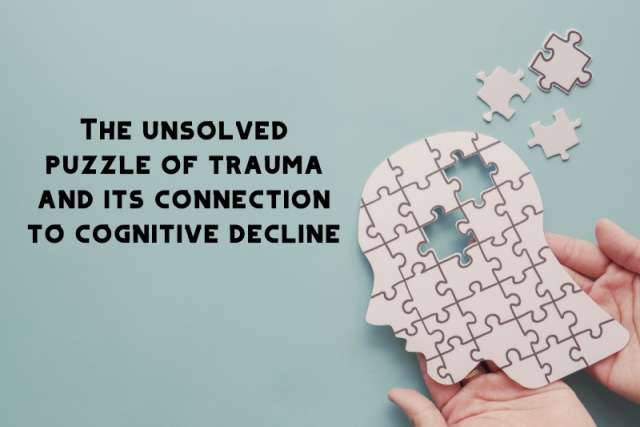After a traumatic event, a person may experience some immediate impacts to their mental health. Shock, for example, is the body and mind’s initial way of protecting them from the full impact of the trauma. If the person has difficulty accepting that the event happened, they may also quickly experience denial as a coping mechanism to manage overwhelming emotions or reality.
However, the impacts of trauma on brain health years after the initial event has taken place are not as well understood. Now, new research from April Thames, PhD, clinical neuropsychologist and professor of psychiatry at the Jane and Terry Semel Institute for Neuroscience and Human Behavior, has shed light on the long-term neurological consequences of untreated trauma.
According to Dr. Thames, there’s a risk for individuals with unresolved trauma of down-the-road brain disorders, including dementia. Dementia is a broad term for a decline in cognitive function severe enough to interfere with daily life. It is not a single disease but a general term that encompasses a wide range of specific medical conditions, including Alzheimer’s disease and other neurodegenerative diseases.
Dr. Thames and several of her colleagues have been studying whether individuals with trauma early in life have more risk of developing this cognitive decline as they age. She notes a pattern in coping strategies among those with unresolved trauma: “They tend to check out – what we call ‘dissociate.’
"For example, let's say somebody's talking to you, but you're thinking about something else going on,” Dr. Thames explains. “You're not going to take in everything that person says. So later on, if you're asked about that conversation, you're going to forget."
The tendency to dissociate can lead to significant memory issues. Clinically, Dr. Thames has observed a worrying trend: "Sometimes, as people get to that middle age, you know, late 40s, early 50s, they report forgetting pretty significant events that occurred."
Dr. Thames recounts the experience of a patient who "drove all the way to San Diego and didn't remember driving there," highlighting the severe nature of memory lapses that can occur.
Interestingly, this phenomenon isn't due to a straightforward inability to form memories, she says.
"If I’m testing certain patients of this demographic in a setting where I have them in a room by themselves, and I give them a list of words to try to remember, they're able to recall it," Dr. Thames says. “However, the issues with remembering the list come when they’re dealing with life stressors.” This discrepancy is particularly noticeable in controlled testing environments, which are free from the distractions that typically trigger dissociative responses.
The findings imply that the impact of early-life trauma and adversity can result in lifelong changes that affect the way the brain develops – changes, she says, that make one potentially vulnerable to dementia in middle and old age.
A case for treatment
Research published in the Journal of the American Medical Association has noted that individuals with a history of trauma or post-traumatic stress disorder (PTSD) have a heightened risk of cognitive decline. Another study in the "British Journal of Psychiatry" suggests that childhood trauma is associated with an increased risk of cognitive impairment in later life.
What are the possible biological factors at play? Studies have shown that individuals who experience chronic stress or trauma have higher levels of cortisol, a stress hormone that, over time, can damage the brain, particularly areas like the hippocampus, which is vital for memory formation. Such damage can increase the risk of developing neurodegenerative diseases like Alzheimer's, the most common form of dementia.
Coupled with Dr. Thames' clinical findings, these studies build a compelling case for the long-term neurological impact of unresolved trauma, she says. They underscore the “importance of treating trauma-related disorders proactively” with early intervention and consistent mental health support.
Understanding and addressing the long-term effects of trauma can help individuals develop healthier coping mechanisms than dissociation, and potentially reduce the risk of future cognitive decline, she says.




